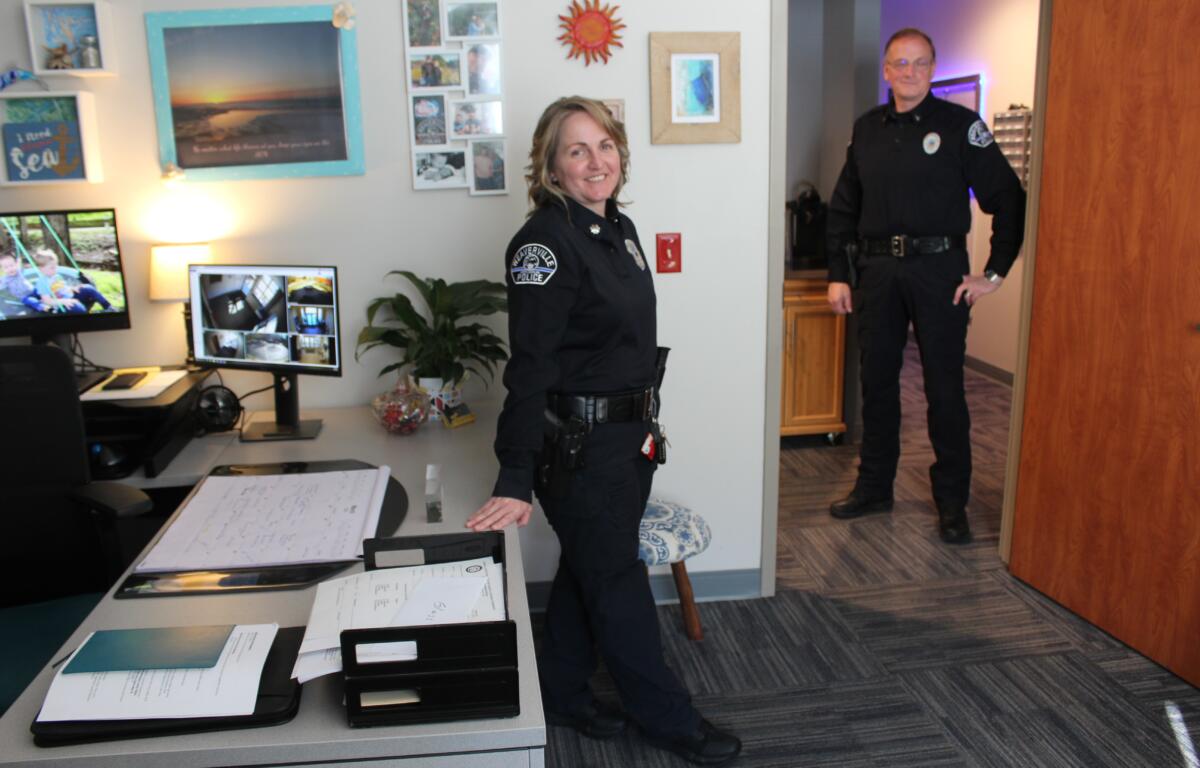WEAVERVILLE, NC (828newsNOW.COM) – When Somer Oberlin takes over as Weaverville Police Chief this week, she won’t move into the larger office space that retiring Chief Ron Davis has occupied since 2018.
Her cozy, little assistant chief’s office suits her just fine. It’s down the main hallway, closer to the visitors’ entrance, and near the coffee machine where rank-and-file officers fuel up on caffeine during their shifts.
“My passion in the department is my relationships with people. I didn’t want to move further away from the officers back there,” Oberlin said. “It keeps you better connected, I think.”
Weaverville’s first female police chief said she has a lot in common with the man she’s replacing. They’re both rather low-key, calm, family-oriented, collaborative and speak of taking moderate approaches to keeping the peace in an ever more polarized world.
But unlike Davis, who parlayed a military background into a four-decade rise through the ranks of law enforcement, Oberlin took a non-traditional route to her cozy little chief’s office.
A native of Kalamazoo, Mich., she moved to Madison County in 2004. She worked in patient care, assisting in neurological rehabilitation. She spent time working as a barista. She did a variety of clerical tasks working for the Madison County News-Record & Sentinel.
Oberlin, 48, said that by 2012, she was “feeling a little unsettled” in the newspaper job, so one day she sat on the hill in front of her house and prayed to God for guidance. Not long after, she was outside the newspaper one day when she bumped into the Madison County Sheriff Buddy Harwood, who told her: “Sunshine, come over here. I want to give you a job.”
Turns out, with the opening of the new Madison County Jail, he needed female detention officers. The sheriff knew her from her work in the community. “He liked my work ethic,” Oberlin said. Soon, she was on a whole new career path.
“I asked God for a sign and he sent the sheriff,” Oberlin said with a laugh.
After two years in detention, she made the switch to the Weaverville Police Department in 2014. She started as a patrol officer, was made a detective in 2017, served as interim chief before Davis’ hiring in 2018, and later was promoted to lieutenant. In 2020, Chief Davis appointed her assistant chief.
Oberlin said she came to realize the importance of having women in law enforcement roles when a woman close to her was the victim of a crime and had to recount her story to an all-male team of investigators and officers.

In a recent joint interview with 828newsNOW, Oberlin and Davis echoed each other quite often when talking about their “moderate,” personable approach to public safety.
Davis, 59, said his personality always suited Weaverville’s unique geography. “If you go north of us, it’s extremely conservative. If you go south of us, it’s extremely liberal,” he said. “It kind of fits with me in my style, in trying to be a moderate, meet on some middle ground.” And keep the peace.
Davis got his start in the military during a peacetime era of the late 1980s. His parents signed a waiver so he could join the National Guard at age 17. He completed basic training while still in high school. He later served with the army’s 82nd Airborne Division as a paratrooper, with deployments including Germany and Egypt.
Wanting to return to his roots in Henderson County, he shifted to law enforcement in 1987. He started with Hendersonville police and later worked as an investigator for the county’s District Attorney’s Office. After the Sept. 11, 2001, terrorist attacks and the subsequent military actions, he served as a civilian police adviser in both Iraq and Afghanistan. He became as assistant police chief in Fletcher for eight years, before he was named Weaverville Police Chief in December 2018.
Much has changed in the world – and law enforcement – since Davis first put on a police uniform.
Sept. 11, 2001, brought more gratitude to first responders. The wars brought military-style gear and technology into even the smallest police departments. Covid-19 mask mandates brought some tension. And some high-profile brutality cases around the country drew increased scrutiny and political divisions over law enforcement.
“There was a real polarization in how people viewed us,” Davis said.
He and new Chief Oberlin both talk about the effect of social media, too.
Oberlin talks about young “keyboard warriors” who’ve been raised with computers and social media banter, and how some have difficulty dealing with face-to-face conflicts without aggression.
“You have to figure out how to be a moderate and bring peace,” Oberlin said.
In that, she sounds a lot like the man she’s replacing.
“Chief Davis’ retiring from the agency is not the classic ‘turning the page to another chapter,’” she said. “He is leaving a legacy.”
Davis said he’s proud that Oberlin is following in his footsteps: “If I did my job pretty good, she’s going to do my job a lot better than I did.”


